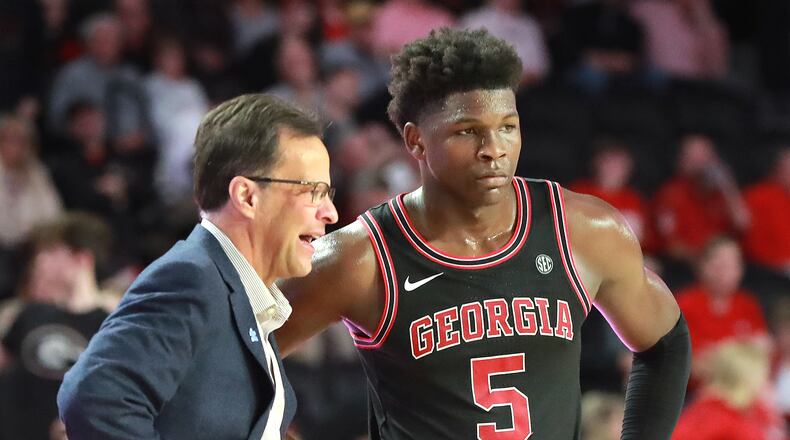See the sky? Contrary to popular belief, it’s not falling. So said Tom Crean, the Georgia coach who after three seasons is still searching for traction in a sport where the transfer portal has spawned what he calls “college free agency” and wrought havoc with his Georgia roster.
Said Crean, speaking Wednesday morning: “When it’s close to home, it seems different.”
His point being: Georgia can’t be deemed an utter outlier. Five Bulldogs have entered the portal in 2021, including starters Toumani Camara, Tye Fagan and most recently Sahvir Wheeler. Duke, Auburn, Florida and Michigan State have seen four players avail themselves of the portal. According to VerbalCommits.com, 1,424 players are seeking what they believe to be greener pastures. Indeed, the exodus of Bulldogs has been, at least numbers-wise, a wash. To replace his transfers, Crean has received commitments from ... um, four transfers.
“I check VerbalCommits every 10 minutes,” he said.
Thing is, Duke and Michigan State are proven commodities. Georgia is not. Crean is earning $3.2 million per year to make the Bulldogs a consistent winner, which they haven’t been since the early days of Hugh Durham. Over Crean’s three seasons, Georgia is 41-49 overall, 14-40 in SEC play. In 2019-2020, a team with Anthony Edwards, who became the NBA’s No. 1 pick, and the nation’s 11th-best recruiting class could do no better than 16-14 before COVID-19 halted everything. Of the seven members of that signing class, all are going or gone.
Asked if he has come to doubt whether he can turn a mediocre program – Georgia hasn’t made the NCAA Tournament since 2015, hasn’t won an NCAA game since 2002 – into a winner, Crean said: “No, not at all. Not at all. I think we’ve got a better lay of the land. We have a better idea what we’re up against in recruiting. We have an incredible university with an incredible fan base. When portal situations hit, you have to embrace it. You don’t have to love it, but you have to embrace it.”
To be fair, the past two seasons in college hoops were nothing anyone could have imagined. The pandemic halted everything March 12, 2020. Coaches haven’t been allowed to see recruits in person since. (The moratorium is set to be lifted June 1.) Every senior in 2020-21 was granted an extra season of eligibility, which has had the effect of turning the transfer portal into the world’s most crowded departure gate.
Said Crean: “We’re recruiting from the portal as we’re losing players. But you can’t lose sight of what your values are. Building a program is the most important thing.”
And: “I don’t want to get people who are independent contractors who are worried about stats. I want to win. I want kids who want to win.”
And: “Continuity is up for grabs. Even the blueblood programs are having to deal with this.”
Duke missed the NCAA Tournament for the first time since 1996. Kentucky finished below .500 for the first time since 1989. Roy Williams quit at North Carolina after seeing freshman Walker Kessler and senior Garrison Brooks enter the portal. (Kessler has landed at Auburn, Brooks at Mississippi State.) In the effort to give players more control over their career paths, the NCAA portal has loosed something approaching anarchy.
Crean: “There’s a saying, ‘It’s not the players you don’t get that hurt you – it’s the players you do get that can’t help you.’ The pressure of this job is not that people leave. I can deal with crisis management because I’ve had to do it. Nothing could top what we went through at Indiana.”
Crean inherited an Indiana program bound for probation after Kelvin Sampson flouted NCAA regulations regarding phone calls to recruits. (His Houston team just made the Final Four.) The Hoosiers were 28-66 over Crean’s first three seasons. They made the NCAA Tournament four times over the next five years, reaching the Sweet 16 three times. “And there was no transfer portal or grad transfers then,” he said.
The belief here remains that Crean was a good hire, that he’s a good coach. Still, beliefs need to be buttressed by achievement. Even as we stipulate that the portal and the virus have made rebuilding exponentially more difficult, we concede that Crean hasn’t yet proved an upgrade. (Mark Fox’s final three seasons saw Georgia go 57-44 overall, 26-28 in SEC play.) Portal or no portal, at some point a coach must win to keep his job,. This coach no longer works for the athletic director who hired him.
Even Crean acknowledged reality: “You can’t get sustainability without traction.”
And it’s tough to find a foothold if you’re starting over every year. Of Georgia’s comings and goings, Crean said: “No question it’s a punch in the stomach. But if you fall down or let it knock you down, that’s your fault. That to me is where we are.”
There is, he said, “certainly no book for this. It’s learning on the fly. … You have to brace yourself. What’s dangerous is the moment you think you’re going to have kids for a long time. You have to have a long-term vision but coach with short-term urgency.”
And: “We haven’t cut any corners in how we’re trying to do things.”
That it hasn’t happened yet for Crean doesn’t mean it can’t or won’t. But this is college basketball, where the transfer portal has accelerated everything. For now, he has internal support. Last week Josh Brooks, the new AD, told the AJC’s Chip Towers: “Through my meetings with coach Crean and his staff, I feel very good about our ability to adapt to the new environment.”
Said Crean: “If I were a first-time coach, I’d be scared to death. But compared to what I through at Marquette and Indiana, this is nothing. I don’t say that flippantly. I say that confidently.”
About the Author
The Latest
Featured



